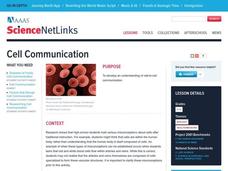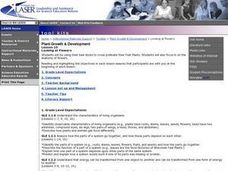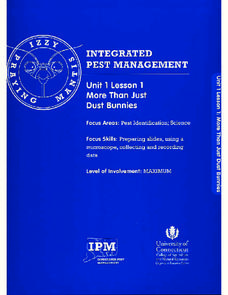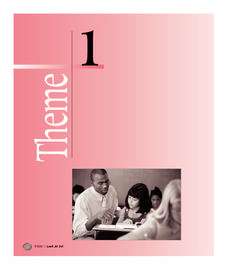Curated OER
Cell Communication
Students clarify common misconceptions about cells. They assess initial knowledge of cells and cell behavior, read and discuss an article and consider the role of cell communication in the diseases of diabetes, multiple sclerosis and...
Science 4 Inquiry
Frenemies, Bros and Killers: A Lesson in Symbiosis
Animals and plants develop relationships and rely on each other to survive. Pupils learn more about symbiosis through a video, a hands-on matching activity, and a game. They differentiate and describe each type on a written evaluation.
K12 Reader
Plant Life Cycles
Plant life cycles are the focus of a life science worksheet that is designed as a reading comprehension exercise. Readers respond to five questions based on the passage.
Curated OER
Butterfly Lesson Plans
Students study the life cycle of the Monarch Chrysalis. In this butterfly life cycle lesson, students study the monarch butterfly life cycle and focus on the fourth stage of the life cycle. Students draw a picture about the fourth stage...
Curated OER
RAINFOREST Mini-Unit
Students engage in a variety of activities to investigate the subject of rainforests. The lesson focuses on the different floors of the rainforest and the types of life that exists on each.
Curated OER
Signs of the Seasons
Students closely observe the natural world, record data, and notice patterns as the seasons unfold, they build a deeper understanding of seasonal change! The definition of phonology is the focus of this activity and how it changes...
Curated OER
Natural Resource Awareness
Seventh graders design a collage that shows natural resources or things made from natural resources. They discuss the collages and decide how they use natural resources at home and school. They listen to a read aloud of a Native American...
Curated OER
Looking at Flowers
Students use their bee sticks to cross-pollinate their Fast Plants and also focus in on the anatomy of flowers. They analyze how the parts of a system go together, and how these parts depend on each other. Finally, students describe...
Curated OER
Animal Life Cycles
Learners participate in numerous activities to gather information about parts of the life cycle. In this life science lesson, the teacher choose from a number of activities to create or support an interdisciplinary unit about the life...
Curated OER
Animal Games
Students explore a variety of games on the Internet that will teach them about animals; they focus on the Florida panther. Students choose the activity that is of interest to them, and then rotate between the games online and the games...
Curated OER
Beaver Ecology
Learners explore the lives of bgeahvers. They identify the physical and behavioral adaptations that help beavers survive in their environment. Students compare and contrast how beavers influence the ecology of both forest and aquatic...
Curated OER
Animal Explorations
Students discover compassion for animals. In this animal lesson, students go to a local animal welfare organization and help out. They reflect on compassion and how to make changes in the lives of animals.
Curated OER
Air and Water in the Environment
Second graders participate in a three part lesson in which they identify and describe forms of moisture in the environment. Part one of the lesson involves the three stages of the water cycle, part two focuses on creating humidity by...
University of Connecticut
More Than Just Dust Bunnies
Teenagers will never complain about cleaning their rooms after this activity. In the first lesson of a four-part series, budding scientists collect samples of dust, chalk, and other particulates from various areas of the classroom. They...
University of Connecticut
Building Your Own Biosphere
On September 26, 1991, four women and four men entered the scientific experiment, Biosphere 2; the doors were sealed for two years in order to study the interactions of a biosphere. In the activity, scholars explore biospheres by...
American Museum of Natural History
Create Your Own Time Capsule
The corona virus pandemic is indeed a historic event. A time capsule activity permits young historians to document these days of social distancing, remote learning, and quarantine by collecting artifacts that capture what their lives are...
Curated OER
Save a Reef!
Design a public information campaign to improve understanding of the coral reef crisis. Read about and discuss the biology and threats to the coral reef. The class creates a public information program about the problems facing the coral...
Curated OER
Elizabeti's Series--Classroom Guide
Second graders explore the books in the Elizabeti Series. In this reading comprehension lesson, young readers discuss pre-reading focus questions about their feelings on the first day of school. They investigate the book and describe the...
NASA
Geographical Influences
"If global warming is real, why is it so cold?" Distinguishing the difference between weather and climate is important when it comes to understanding our planet. In these activities, young scientists look at the climate patterns in a...
Curated OER
Where's Dinner?
Upcoming marine biologists consider a list of organisms residing near the Lost City hydrothermal vents and construct a food web. They compare the food web to that of a cold seep community, of which they should have previous knowledge....
University of Minnesota
Connect the Neurons!
Create a neuron frenzy as your pupils play the part of the neurons. An engaging lesson creates a human chain of neurons that pass cotton balls posing as neurotransmitters. Scholars learn about pre- and post-synapses as they complete the...
Curated OER
Exploring Learned and Innate Behavior
Students explore the differences between learned and innate behavior among humans and monkeys. They complete an assignment and read articles about two studies, which used similar test methods to show that infants and monkeys share an...
Houghton Mifflin Harcourt
Look at Us!: Challenge Activities (Theme 1)
Challenge your advanced learners with this set of activities based around a common theme. Learners draw, research, share, retell stories, compare and contrast, and more over the course of these activities, which focus mostly on animals...
K12 Reader
Limited Resources
The difference between renewable and non-renewable resources is the focus of a short reading comprehension worksheet that asks kids to respond to a series of questions based on the provided passage.

























